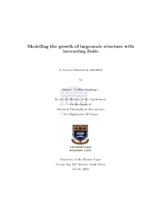Modelling the growth of large-scale structure with interacting fluids
Abstract
Prevailing astronomical and astrophysical observations suggest that we live in a spatially flat cold dark matter (CDM) universe - currently going through a period of accelerated expansion possibly driven by “dark energy” in form of a cosmological constant. Within the standard cosmological paradigm, dark energy and dark matter are the dual dominant sources in the evolution of the late-time universe contributing about 70% and 25% respectively to the total energy density in the Universe, but these are only currently detected via their gravitational interaction. There could be a non-gravitational interaction within the “dark sector” without violating current observational data, thus giving rise to changes in the dark equations of state and affecting the process of galaxy formation. In this thesis, we investigate two new interesting large-scale structure formation scenarios using interacting fluids. Firstly, in departure from the standard approach in which dark matter is treated as a single independent fluid, we split the dark matter fluid into two interacting components: a strongly clustered “halo” component and a weakly clustered “free” component- accreted by the halos. By defining the fraction of the matter inside CDM “halos” to the total matter as a time evolving function of the total matter density F (ρm), we derive the governing background and perturbation equations and the energy-momentum transfer four-vectors. We then perform numerical calculations for three models for F (ρm) that are in agreement with recently published results from halo theory of N-body simulations, and compare our results to the standard ΛCDM model. Our results show that, whereas there’s a good agreement between our model and the ΛCDM model, the perturbations are much more sensitive to the interaction and can deviate strongly from the standard case for large interaction strengths. Secondly, motivated by our current poor knowledge on the underlying “dark- sector” physics and the need to understand the nature of the two most dominant components of our universe: dark energy and dark matter; we investigate a new scenario in which the two dark components interact via an energy-momentum exchange. By re-writing the evolution equations in a more suitable form, we eliminate previously reported singularities in interacting dark energy models in which dark energy is tested to be vacuum energy with w → −1. This makes it possible to numerically integrate the resulting background and perturbation equations, comparing our results to the standard model. We show that this treatment, yields a simple model that provides a good natural extension to the standard ΛCDM model. We go further to explore in detail the cosmological implications of the interaction strength and the direction of the energy-momentum transfer in vacuum interacting dark energy. This thesis provides useful insights on the possible significance of a dark sector interaction in structure formation and shows that such an interaction provides a good natural explanation for the high value of the Hubble parameters measured by BOSS and SDSS surveys. Indeed a small and positive coupling is shown to alleviate the well-known cosmological coincidence problem.

